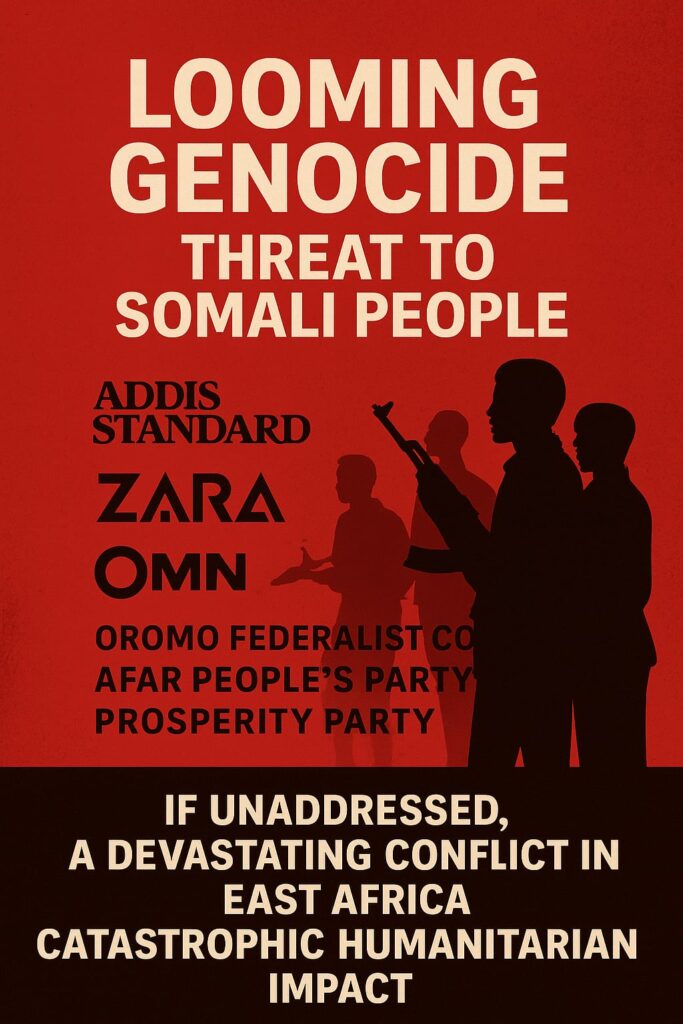While international and local eyes remain fixed on the conflicts in Amhara, Oromia and Tigray crisis, a slow-motion ethnic cleansing is unfolding in eastern Ethiopia—largely ignored by media, governments, and humanitarian agencies alike. In the Sitti zone of Ethiopia’s Somali region, thousands of Somali civilians have been killed, over 200,000 displaced, and entire communities wiped off the map—yet their suffering remains invisible.
Since 2019, the Afar regional government, backed by militias and enabled by Ethiopia’s federal authorities, has carried out a coordinated campaign of violence against Somali communities in the Western Sitti zone towns such as Garbaissa, Udhufo, and Aydaytu—along with 11 villages and the vital pastoral lands surrounding them, and have been forcibly occupied. The United Nations estimates that more than 200,000 people have been forcefully displaced. The survivals reported more than 6000 civilians killed directly by the attacks, more than thousands death due to diseases and malnutrition. The destruction of homes, water sources, and livestock has devastated the region’s pastoral way of life.
The campaign is not just territorial—it’s deeply ethnic. Somali civilians, including women and children, have been targeted for no reason other than their identity. Afar forces and affiliated militias operate with impunity, while the Ethiopian state, far from protecting its citizens, appears complicit. The Somali population in this area is treated not as part of Ethiopia, but as a foreign presence to be erased.
Worse still, the silence from Ethiopia’s own Somali regional government in Jigjiga is not only shocking, but also indication of complicity. Rather than defending their constituents, local leaders have, in some cases, worked to legitimize this land grab. Displaced Somalis who attempt to return or resist are harassed or jailed—not by Afar forces, but by their own regional police.
This is not just a case of government neglect—it’s a systemic failure. Somali residents of the West Sitti zone have been disenfranchised for decades, barred from meaningful political participation. They have not been allowed to vote in national elections, and for nearly 30 years, they’ve lacked access to basic social services. Now, they are being pushed from their ancestral land, their villages destroyed, their animals—often their only livelihood—scattered or stolen.
Why is this happening? Lack of genuine Somali people representation and inclusiveness from Federal security forces. Ethiopia’s ethnic federalism has intensified competition between regions, and in the absence of strong Somali region and inclusive national institutions, violence and imposed political decisions become a tool to control Somali region land. The Sitti zone lies along the critical trade corridor to Djibouti, making it strategically valuable. That value is now being exploited, with devastating human costs.
And yet, there has been no national or international outcry. No Human rights groups report. No high-profile campaigns. When Tigray burned, the world responded. When Oromo bleeds, people take to the streets. But the Somali people in Ethiopia —caught between hostile elements in neighboring states-Oromia and Afar, an incompetent and corrupted Somali state, and a world that has written them off—have no voice. They are suffering in silence.
This silence must end.
Human rights organizations must investigate the atrocities in the West Sitti of Ethiopia’s Somali region. Humanitarian aid must reach the displaced. Ethiopian federal and regional authorities; Afar, Ethiopia federal force, and Somali region, must be held accountable—not just by international bodies, but by their own constitution, which guarantees protection and equality for all citizens. And the media must stop overlooking this crisis simply because it is hidden in a rural, Somali-speaking corner of Ethiopia.
The Somali people have lived in the West Sitti zone of Ethiopia Somali state for centuries. They are not outsiders. They are Ethiopians. If their cries continue to go unheard, history will judge not just those who committed these crimes—but those who stood by and watched. It definitely damaged co-existence and confidence of Somali people in Ethiopia government institutions – certainly future national consensus building.

